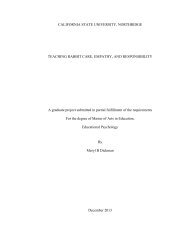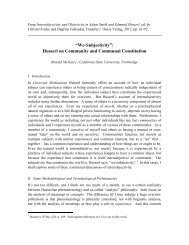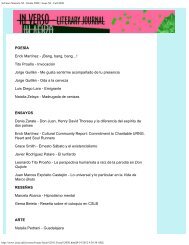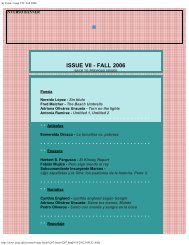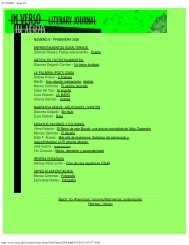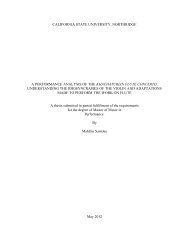Safe-Sex Knowledge, Sexual Behavior, and Drug Use A thesis
Safe-Sex Knowledge, Sexual Behavior, and Drug Use A thesis
Safe-Sex Knowledge, Sexual Behavior, and Drug Use A thesis
You also want an ePaper? Increase the reach of your titles
YUMPU automatically turns print PDFs into web optimized ePapers that Google loves.
Kropp, Silvera, & Lavack, 2004).<br />
Self-esteem might also deter an individual from getting tested for STIs. Low selfesteem<br />
has been correlated with negative self-image <strong>and</strong> failure to seek adequate health<br />
care in general, even in addition to reduced condom self-efficacy (Brafford & Beck,<br />
1991).<br />
Risky <strong>Behavior</strong>s<br />
Low self-esteem has been shown to lead to risky behavior (e.g., alcoholism.) In<br />
work carried out by Steffenhagen & Steffenhagen (1985), low self-esteem was<br />
determined to be a cause of alcoholism, via depression. Low self-esteem plays a role in<br />
fostering behaviors that can be self-detrimental, directly <strong>and</strong> indirectly. Leigh (1993)<br />
found that respondents were more likely to engage in high-risk behaviors, such as<br />
unprotected sex, when they are under the influence of drugs or alcohol. One risky<br />
behavior can often lead to or be associated with another.<br />
<strong>Drug</strong> <strong>and</strong> alcohol use may actually contribute to less knowledge about STIs.<br />
Though, it is uncertain whether this impacts the source of knowledge regarding safe-sex<br />
practices. People who smoke <strong>and</strong> drink alcohol are less knowledgeable about HIV/AIDS<br />
than non-smokers <strong>and</strong> those who do not drink alcohol, according to work by Yi (1998).<br />
Furthermore, those studied who use marijuana have less knowledge than those<br />
individuals who never use marijuana.<br />
5



